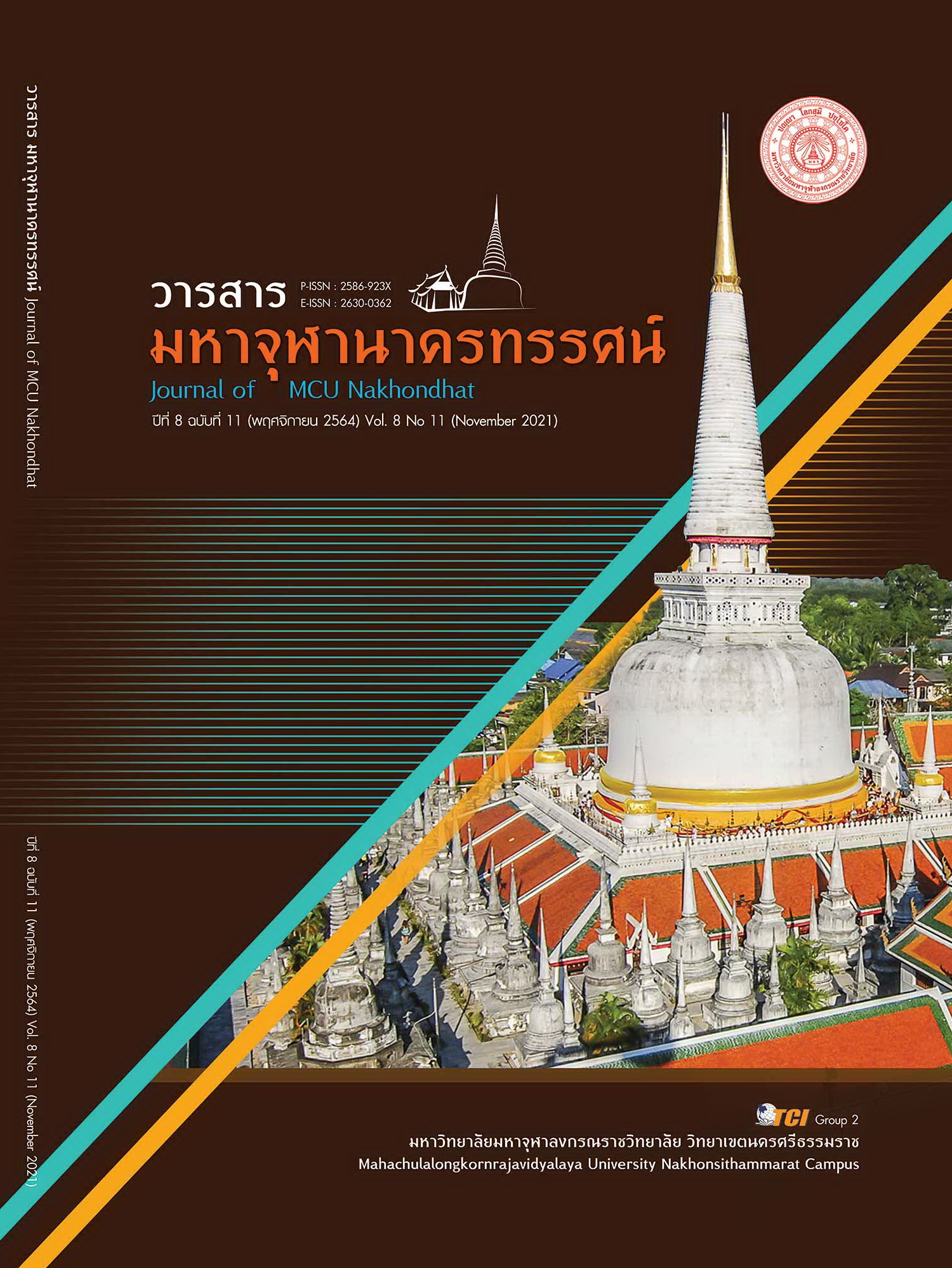CONFLICT MANAGEMENT IN ORGANIZATION USING THE PARADIGM OF PUBLIC ADMINISTRATION
Main Article Content
Abstract
This article aims to study conflict management in organization using the paradigm of public administration. Data collection methods were used by analyzing documents related to conflict management. and the use of methods that are consistent with the public administration paradigm. This article uses the New Public management as a framework for analysis because the new approach of public administration is the transformation of public administration by applying the principles of increasing the efficiency of the bureaucratic system and seeking efficiency in the performance of government services that lead to excellence. by applying the guidelines or methods of administration of the private sector to apply to government administration such as result-base management, professional management, cost-effectiveness. Findings from this research papers acquired from research articles, academic articles, and books. Which are categorized by issues and presented with descriptive information and synthesize important components. Finding were as follow: 1) Conflict Management Using Win-Win Method is an administration for all parties can come to an agreement. 2) Conflict Management Using Organizational Structure Method is to set regulations rules of recruitment. 3) Conflict Management through Non-Violent Communication use of dialogue conversational to mediate. 4) Power of Conflict Management the power use in cases when conflicts cannot control the situation. 5) Conflict Management Using Confrontation Avoidance is not avoiding problems but to avoid conflict in order to prevent encountering problems
Article Details
References
ชณภา ปุญณนันท์ . (2563). ความขัดแย้ง: แนวทางการแก้ไขผ่านปรัชญากุญแจเก้าดอกของสถาบันพลังจิต ธรรมะ จักรวาล. วารสารมนุษยศาสตร์และสังคมศาสตร์ มหาวิทยาลัยราชภัฏอุบลราชธานี, 11(2), 190-199.
ทศพร ศิริสัมพันธ์. (2551). “ทิศทางและแนวโน้มของรัฐประศาสนศาสตร์” ใน ประมวลสาระชุดวิชาแนวคิด ทฤษฎี และหลักการรัฐประศาสนศาสตร์ หน่วยที่ 15. น. 439-476. นนทบุรี: มหาวิทยาลัยสุโขทัยธรรมาธิราช.
ปรารถนา หลีกภัย. (2564). การบริหารความขัดแย้งการบริหารความขัดแย้งจากการทำงานของข้าราชการครูในจังหวัดตรัง. วารสารสถาบันพระปกเกล้า, 19 (1), 93-113.
ปัณณพงศ์ วงศ์ราศี. (2015). ความขัดแย้งและการจัดการความขัดแย้งบริบทในสังคมไทย. วารสารสำนักหอสมุด มหาวิทยาลัยทักษิณ, (4), 59-81.
ศิริวรรณ มนอัตระผดุง. (2559). การบริหารความขัดแย้งในองค์การอย่างสร้างสรรค์. วารสารวไลยอลงกรณ์ปริทัศน์ มนุษยศาสตร์และสังคมศาสตร์, 6(2), 193-208.
สัญญา เคณาภูมิ. (2562). กระบวนทัศน์แห่งอนาคตของรัฐประศาสนศาสตร์. วารสารนวัตกรรมการจัดการภาครัฐและภาคเอกชน, 7(2), 39-66.
สาริศา เจนเขว้า. (2563). ทางเลือกการบริหารความขัดแย้งการบริหารความขัดแย้งในองค์การ. วารสารการบริหารนิติบุคคล, 6(2), 229-241.
สิญาธร นาคพิน, วิลาวัณย์ สมบูรณ. (2562). การบริหารความขัดแย้งในองค์กรภาครัฐ ยุคประเทศไทย 4.0. วารสารราชภัฏสุราษฎร์ธานี, 6(2), 21-46.
อาชิรญาณ์ เขียวชอุ่มและคณะ. (2557). การบริหารความขัดแย้งการบริหารความขัดแย้งของผู้บริหารสถานศึกษา สังกัดสำนักงานเขตพื้นที่การศึกษาประถมศึกษาบึงกาฬ. วารสารมหาวิทยาลัยนครพนม, 4(3), 124-131.
อุไร ส้มเกลี้ยง, อรุษ คงรุ่งโชค, สิญาธร นาคพิน. (2562). การบริหารความขัดแย้งของพนักงานในองค์กรภาครัฐ. วารสารหาดใหญ่วิชาการ, 18(1), 163-176.
Davor, D. (2008). Conflict Management in Organization. Interdisciplinary Management Research, (4), 505-515.
Hood, Christopher. (1991). Manage for all seasons. Public Administration, Vol.69, 4-5.
Khakhai, K. (2012). A study of the management compatency of a chief executive officer at a bureaucracy orgenization’s and a private enterprise. Bangkok: Suan Sunandha Rajabhat University.
Kuhn, T. S. (2012). The structure of scientific revolutions. University of Chicago press.
March, J. G. & Simon, H. A. (1998). Organization. New York: John Wiley and sons, Inc.
McShane, S. L., & Von Glinow, M. A. (2015). Organizational Behavior: Emerging Realities for the Workplace Revolution. Boston: McGraw-Hill/Irwin.
Nicholas, H. (2010). Public Administration and Public Affair 12th ed. New Jersey: Prentice Hall.
Robbins, S.P. and Judge, T.A. (2013). Organisational Behavior15th. Pearson: Boston.
Thomas, K. (1976). Conflict and Management in Handbook of Industrial and Organizational Psychology. Chicago MA: Rand McNally.


